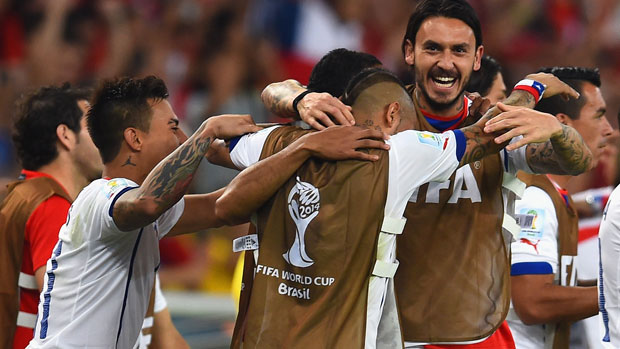Why are American teams dominating the World Cup?
New World sides have won 11 of 14 games against sides from other continents

A free daily email with the biggest news stories of the day – and the best features from TheWeek.com
You are now subscribed
Your newsletter sign-up was successful
Cristiano Ronaldo's inch-perfect cross for Portugal's last-minute equaliser against the USA did more than just keep his side in the World Cup, it also earned a European side a share of the spoils against American opposition for just the third time this tournament.
So far in Brazil, there have been 14 games between sides from New World and opposition from other continents. The Americans have won 11 of them. France and Switzerland, who beat Honduras and Ecuador in their opening Group E games, are the only teams to have got the better of their American rivals.
Among the shocks have been Chile's defeat of Spain, Uruguay's win against England and Costa Rica's triumph over Italy.
The Week
Escape your echo chamber. Get the facts behind the news, plus analysis from multiple perspectives.

Sign up for The Week's Free Newsletters
From our morning news briefing to a weekly Good News Newsletter, get the best of The Week delivered directly to your inbox.
From our morning news briefing to a weekly Good News Newsletter, get the best of The Week delivered directly to your inbox.
Of the ten American teams in the tournament, four have booked a place in the last 16 after just two games, and none are out. Realistically, nine of the New World nations (Honduras look doomed) could make the knock-out stages
In the build-up to the tournament much was made of the fact that all previous World Cups held in South America had been won by a team from that continent, and results suggest that there could be a similar outcome this time.
It is something of a mystery why, at a tournament for which the players have prepared so assiduously, teams from the Americas prosper.
The question has been addressed by US statistical website FiveThirtyEight, run by pollster Nate Silver. The website predicted American success but not to this extent.
A free daily email with the biggest news stories of the day – and the best features from TheWeek.com
Luck is one possible explanation, but there are plenty of others.
The fanatical support for Latin American nations, rarely experienced by those from other continents, may be important. The results could have "something to do with the stadium atmosphere", says Silver. "Because partisan crowds seem to affect officiating decisions in soccer, that could mean [American] teams are getting a bit more slack from the officials."
It may also affect the players, says Bloomberg. "The support from traveling fans is supplying extra adrenaline to teams from the region," it claims.
The climate also plays a part, and the South Americans' "explosive" style is better suited to the hot and humid conditions of some venues, it adds.
Explanations are both "technical and emotional" says the Wall Street Journal. For example, "experts have said the grass here, grown with a mixture of European and South American seeds, is coarser than the grass of the fields of Europe, making it more difficult for the European teams that thrive on playing quick passes across a smooth surface".
So far, only Germany, France and Holland appear to be in a position to challenge the Americans, but whether they can actually win the tournament remains to be seen.